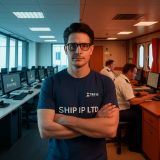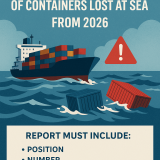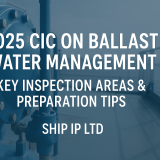Arklow Shipping the Ireland headquartered shipowner and charterer, has contracted communications solutions provider, Satcom Global, to install Aura VSAT across seventeen new build vessels which will begin delivery in 2021.
The new vessels will be activated on a range of Aura service packages, all with Committed Information Rate for guaranteed service quality, and companion options to suit their different sailing patterns. Ten new C-Class vessels will benefit from unlimited Ku-band connectivity with 4G back-up to complement their short sea shipping requirements and operations close to shore. The additional Seven 6,500-ton vessels will have Iridium Certus activated onboard as a high-speed back-up to the primary VSAT connection.
Graeme Gordon, global commercial director at Satcom Global, commented: “As an early adopter of Aura VSAT, we are delighted that Arklow has chosen to extend the service to their new build vessels, ensuring access to the same quality technology and user experience that other vessels in the Arklow fleet have benefited from. It is a pleasure to work with the Arklow team, and we look forward to supporting their evolving communications needs long into the future.”
Arklow currently has 20 vessels using Satcom Global Aura VSAT, supporting communications requirements for both business operations and crew connectivity and wellbeing.
Declan Lott, IT manager at Arklow Shipping commented: “We have firsthand experience of the excellent quality connectivity Aura VSAT delivers, so it was a natural decision to install the service across our growing fleet of vessels. As a ship owner and manager, it is imperative to keep operations running smoothly and the in-depth knowledge that Satcom Global has of our fleet and our needs, enables them to deliver a first-class service and support.”
Satcom Global is providing Intellian v85NX Ku-band systems to deliver the Aura VSAT service to Arklow vessels, boasting the most efficient and high performing RF gain over any other sub 1m antenna on the market. Iridium Certus will be supported by the new feature-rich Intellian C700 terminal.
Source: thedigitalship





